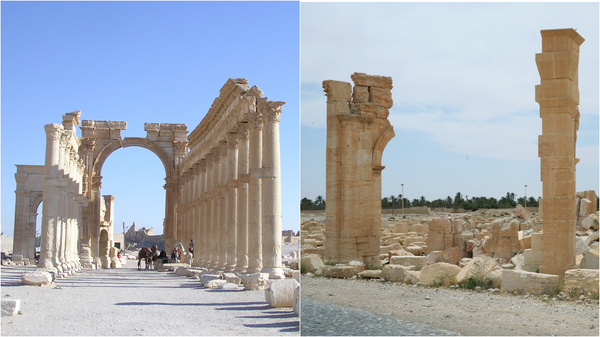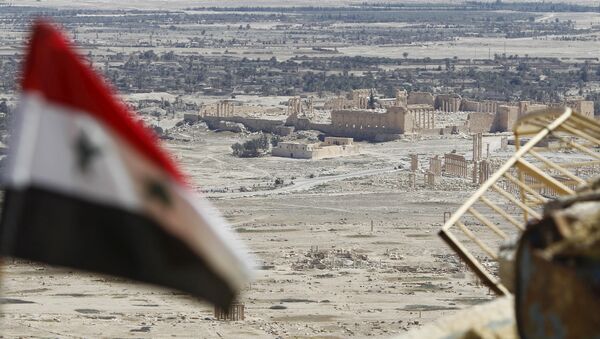Searching for Syria poignantly exposes what life was actually like under Bashar al-Assad's government prior to the arrival of "rebel" forces, via videos, before and after photos and more.
Remarkable imagery documents in crushing detail the savage impact of the war on the country's infrastructure, buildings and people, and provides insight into the lives of those who've fled the conflict.
Millions of you have asked @Google this question. #SearchingforSyria https://t.co/mxNRFTYyvD pic.twitter.com/sV6VEAtwPW
— UN Refugee Agency (@Refugees) May 23, 2017
Data attesting to the scale of the crisis shocks and appalls — for instance, it notes that of the 4.9 million refugees who've fled the concerted assault on their country from within and without, 3.6 million are women and children. In a revelation that is borderline tragicomic, Syria's top search results in 2010 are documented — Arab Idol, bodybuilding, summer fashion and Miley Cyrus.
Likewise, a section of the site graphically reveals the fate of six UNESCO world heritage sites in Syria, in 360 degree clarity. The sites include the ancient cities of Aleppo, Bosra, and Damascus, the ancient villages of Northern Syria, Crac des Chevaliers and Qal'at Salah El-Din and Palmyra.

After panning through the stunning imagery, users then scroll across to see in horrific detail the destruction wrought on each wonder by the conflict. Charts and graphs are also included, along with personal stories from refugees.
The site also encourages visitors to learn how they can help — by signing the UNHCR's petition to pledge support for standing #WithRefugees, making a donation, or sharing the website to raise awareness.
While perhaps launched with noble intentions, and certainly replete with enlightening information, the resource is not without shortcomings.
It sets out to resolve a series of questions relating to the conflict commonly searched for on Google — such as "what was Syria like before the war?" and "what is a refugee?" also "what is going in Syria?" — in response to tens of millions of requests for such answers received in 2016 alone.
Questions are answered with short text blurbs combined with full-screen photos — although full elucidation of the causes of the conflict is conspicuously absent.
The war on Assad did not begin following the Arab Spring in 2011. Instead, it began in 2000, when Qatar proposed to construct a US$10 billion, 1,500 kilometer pipeline through Saudi Arabia, Jordan, Syria and Turkey. Then as now, Qatar's gas could reach European markets only in liquid form, via sea, a method and route restricting volume and significantly increasing cost.
The planned pipeline would have linked Qatar directly to European energy markets via distribution terminals in Turkey, and given the kingdoms of the Persian Gulf domination of the world's natural gas market. However, Assad enraged the Gulf's ruling elites and Western leaders by opting for a Russia-endorsed "Islamic pipeline" running from Iran through Syria to the ports of Lebanon.
Secret cables released by WikiLeaks indicate US, Saudi and Israeli intelligence agencies and military planners quickly decided Assad had to be removed following his rebuff, via fomentation of a Sunni uprising in Syria.
#Syria #Iraq #Libya #Yemen
— Bern'dluminati (@grassrootsify) April 17, 2017
Blueprint on middle east war strategy from Rand:
Unfolding the Future of the Long Warhttps://t.co/HoIsYdr5Pi pic.twitter.com/I9cOXLsaKK
The idea of fomenting civil wars in non-compliant Shiite states in the Middle to maintain control of the region's vast petrochemical reserves was not a new one — in fact, it had existed in the US' toolbox since at least 2008.
A report published that year by the Pentagon-funded Rand Corporation, Unfolding the Future of the Long War, observed that control of the Gulf's oil and gas deposits remained for the US "a strategic priority" that would "interact strongly with prosecuting the long war."
Unfolding the Future of the Long War: Motivations, Prospects, and Implications for the U.S. Army https://t.co/1QpR66OQGJ RANDCorporation
— May Be (@maynon2013) January 18, 2016
Rand recommended using "covert action, information operations and unconventional warfare" to enforce a "divide and rule" strategy in the region, using "local allies" and "nationalist jihadists" to launch a "proxy campaign."
In 2011, the UK formed the Friends of Syria Coalition along with France, Qatar, Saudi Arabia, Turkey and the UK, which formally demanded the removal of Assad. The CIA provided US$6 million to British TV channel Barada to produce pieces calling for Assad's ousting.
WikiLeaks documents again indicate that in 2012, Turkey, Qatar and Saudi Arabia had begun arming, training and funding radical jihadist Sunni fighters from Syria, Iraq and elsewhere to overthrow Assad. Qatar invested US$3 billion in building the insurgency and invited the Pentagon to train insurgents at bases in their country.
However, the Gulf's Sunni autocrats craved greater US involvement — on September 4, 2013, then-Secretary of State John Kerry told a congressional hearing the Kingdoms had offered to pay for a US invasion of Syria.
"Some of them have said that if the US is prepared to go do the whole thing, the way we've done it previously in other places, they'll carry the cost. With respect to Arab countries offering to bear the costs to topple Assad, the answer is profoundly yes, they have. The offer is on the table," Kerry said.
@rcallimachi @brianfishman Do you trust that review that says Iran/Syria ISIS villains or the 2012 U.S. DIA report? https://t.co/LNkCkK5k83 pic.twitter.com/8tYelHSqCs
— John Allan (@johnnallan) March 15, 2017
Assad's justifiable reaction to the foreign-made crisis allowed US leaders to sell the idea the pipeline struggle was in fact a humanitarian battle.
The mainstream media painted fictional pictures of the Free Syrian Army as popular, cohesive, moderate forces. In fact, most rebel fighters were either foreign, or under the command of foreign militants. US intelligence planners were well aware the pro-pipeline proxy armies were radical jihadists who would create a caliphate on territory they occupied — in 2012, a seven-page study by the Defense Intelligence Agency warned of exactly such an eventuality.
What's more, the report's authors of the seven-page report appeared to endorse the prospect.
"If the situation unravels, there is the possibility of establishing a declared or undeclared Salafist principality in eastern Syria and this is exactly what the supporting powers to the opposition want in order to isolate the Syrian regime… [rebel groups could] declare an Islamic state through union with other terrorist organizations in Iraq and Syria."
In what cannot be a coincidence, the regions of Syria once occupied by Daesh and "rebel forces" exactly encompassed the proposed route of the Qatari pipeline.
It is not the first time Google has involved itself in the Syrian crisis — the search giant has invested over US$20 million in providing over 800,000 refugees with emergency support and access to critical information and education.
The site is launched just as the US is endeavoring to block Syrian refugees from entering the country. The Trump administration has taken an increasingly hardline stance on Syria generally — on top of provocative strikes against Syrian targets, the President has proposed cuts to foreign aid, including contributions to the UN and agencies helping refugees.
He has also attempted to stop Syrian refugees from entering the country twice — moves blocked by courts. However, on May 21, US ambassador to the UN Nikki Haley, in seeming contravention of Trump's inclinations, pledged increased US support for refugees.





